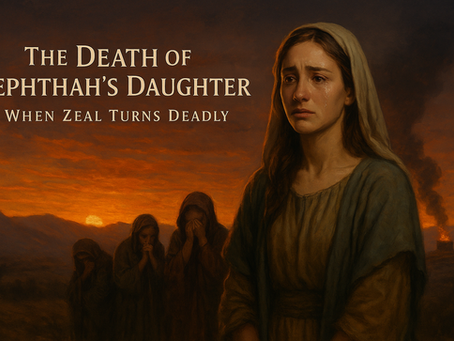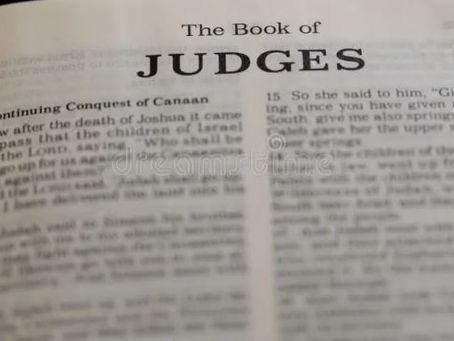top of page


The Levite’s Concubine: When There Was No King
The Levite’s Concubine: When There Was No King. The final story in Judges (chapters 19–21) reads like a moral postmortem of a nation that has lost its soul. It begins with hospitality denied and ends with civil war and near extinction. The account of the Levite and his concubine isn’t meant to shock for shock’s sake—it’s meant to grieve the reader into seeing what happens when a people abandon God’s kingship.
4 min read


Micah’s Idol and the Levite’s Compromise: When Worship Becomes Convenience
Micah’s Idol and the Levite’s Compromise: When Worship Becomes Convenience. The story of Micah’s idol (Judges 17–18) marks the spiritual unraveling of Israel. It is no longer about enemies at the gates—but idolatry in the homes. By this point, Israel doesn’t need foreign invaders to destroy them; they are doing it themselves through religious corruption.
3 min read


Samson: Strength Without Surrender
Samson: Strength Without Surrender. Samson is perhaps Israel’s most famous judge—and its most conflicted. He is a man of supernatural strength and spiritual weakness, a Nazirite consecrated to God yet continually drawn to the world. His story is not about muscles—it’s about mission. Samson shows that the Spirit’s empowerment is no substitute for obedience, and that even the strongest man falls when he stops surrendering.
5 min read


The Death of Jephthah’s Daughter: A Tragedy of Zeal Without Knowledge
The Death of Jephthah’s Daughter: A Tragedy of Zeal Without Knowledge. This isn’t a story about obedience; it’s about a man whose ignorance of God’s character led him to commit the unthinkable in God’s name. Jephthah’s vow and his daughter’s death expose what happens when faith becomes superstition — when human zeal outruns divine truth.
6 min read


Jephthah and the Danger of Rash Vows
Jephthah and the Danger of Rash Vows. Jephthah’s story is one of tragedy born from zeal without wisdom. His rise from outcast to leader, his military victory, and his infamous vow to sacrifice “whatever comes out of the doors of my house” (Judges 11:31) all reveal a sobering truth: passion without understanding can destroy what God intended to bless.
4 min read


Jotham’s Parable: The Trees Choose a King
Jotham’s Parable: The Trees Choose a King. When Abimelech slaughtered his seventy brothers to seize power, only one voice rose from the blood-soaked silence—Jotham’s. Standing atop Mount Gerizim, he didn’t rally soldiers; he preached a story.
4 min read


Abimelech: The King God Never Chose
Abimelech: The King God Never Chose. Abimelech’s story is one of ambition without calling, leadership without character, and power without purpose. It’s the first attempt at monarchy in Israel—and it ends in total collapse.
4 min read


Gideon: From Fear to Faith to Folly
Gideon: From Fear to Faith to Folly. Gideon’s story begins in fear and ends in folly—a warning that spiritual victory requires as much humility after success as it does faith before it. His rise and fall mirror Israel’s own: trembling in weakness, triumphing by God’s Spirit, and then falling into idolatry.
4 min read


Jael: The Woman Who Struck Down Israel’s Enemy
Jael: The Woman Who Struck Down Israel’s Enemy. Jael’s name is forever remembered for a single, shocking act of courage. When the Canaanite commander Sisera fled the battlefield, she gave him shelter—then delivered Israel’s victory with her own hands. Her story demonstrates that God can use anyone, in any circumstance, to accomplish His justice.
2 min read


Deborah: The Prophetess Who Led Israel with Courage and Song
Deborah: The Prophetess Who Led Israel with Courage and Song. Deborah stands out in Israel’s history as a prophetess, judge, and military leader—a woman of wisdom, faith, and strength who inspired a nation to rise and reclaim its freedom. Her leadership reminds us that God raises up deliverers from every background to accomplish His purposes.
3 min read


Deborah and Barak: Prophetic Leadership and the Song of Victory
Deborah and Barak: Prophetic Leadership and the Song of Victory. When Israel was crushed beneath the weight of Canaanite oppression, God raised up not a general or king—but a prophetess named Deborah. In an age when everyone did what was right in their own eyes, Deborah did what was right in God’s. Her leadership, rooted in revelation and courage, stands in striking contrast to Barak’s hesitation and Israel’s fear.
4 min read


Ehud: The Left-Handed Deliverer
Ehud: The Left-Handed Deliverer. The story of Ehud is one of the most unexpected and subversive accounts in the book of Judges. It’s gritty, ironic, and deliberately shocking—proof that God’s deliverance often comes through surprising vessels and unorthodox means.
4 min read


Othniel: The Model Judge
Othniel: The Model Judge. The book of Judges begins with chaos, compromise, and collapse. Israel had entered the Promised Land but not yet surrendered to the Promised Lord. The tribes failed to drive out the remaining nations, and the people began to serve the gods of their neighbors. Into that decline, God raised up deliverers—judges—not as monarchs, but as Spirit-empowered leaders who would rescue His people and remind them who their true King was.
4 min read


Every Man Did What Was Right in His Own Eyes: The Rise and Fall of the Judges
Every Man Did What Was Right in His Own Eyes: The Rise and Fall of the Judges. The book of Judges is one of the darkest chapters in Israel’s story. It begins with conquest and ends with chaos. God’s chosen people, once united under Joshua, descend into moral and spiritual decay. The refrain that defines the era is chillingly modern: “In those days there was no king in Israel; everyone did what was right in his own eyes.” (Judges 21:25, NASB).
4 min read


Every Man Did What Was Right in His Own Eyes: The Anatomy of Moral Relativism
Every Man Did What Was Right in His Own Eyes: The Anatomy of Moral Relativism. When there is no higher standard than personal preference, chaos follows. The book of Judges captures a time in Israel’s history when covenant loyalty gave way to self-rule. Its recurring refrain—“every man did what was right in his own eyes”—is more than a historical observation; it is a timeless diagnosis of moral relativism.
3 min read


Book of Judges Summary: The Cycle of Collapse and the Mercy of God
Book of Judges Summary: The Cycle of Collapse and the Mercy of God. Judges is not a kids’ storybook—no matter how many Sunday school flannelgraphs made it look safe. It’s violent. It’s messy. It’s tragic. And it shows what happens when everyone does what is right in their own eyes. Spoiler alert: things fall apart.
5 min read
bottom of page